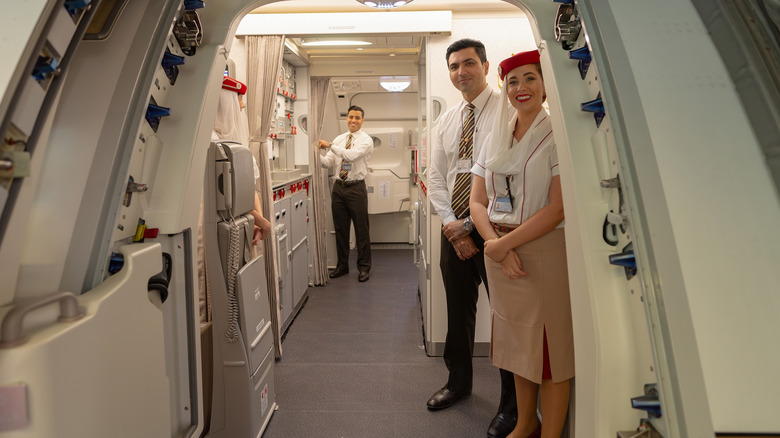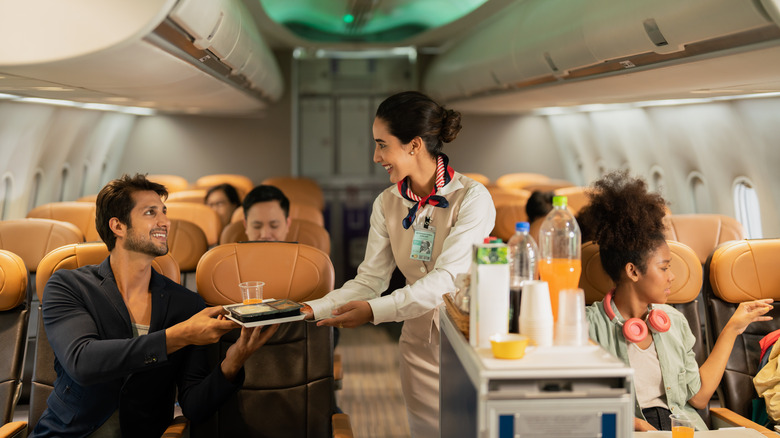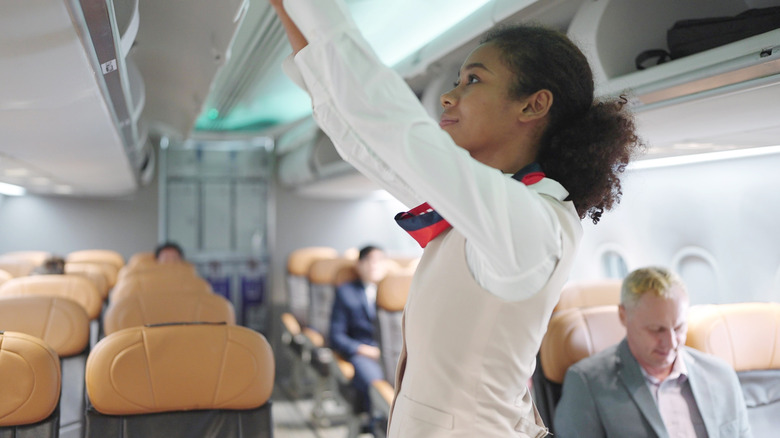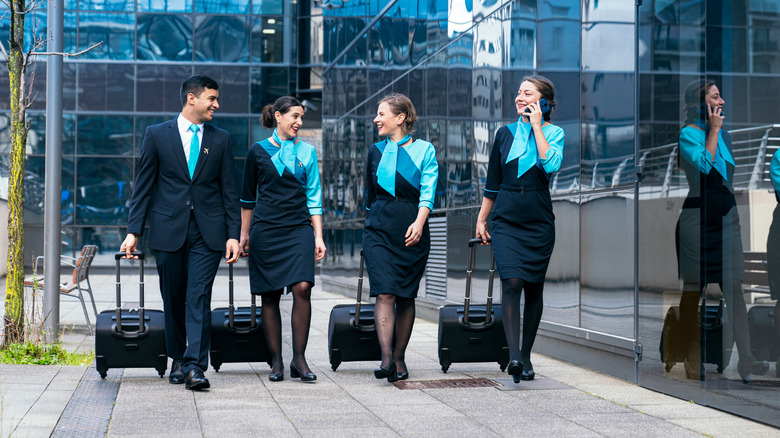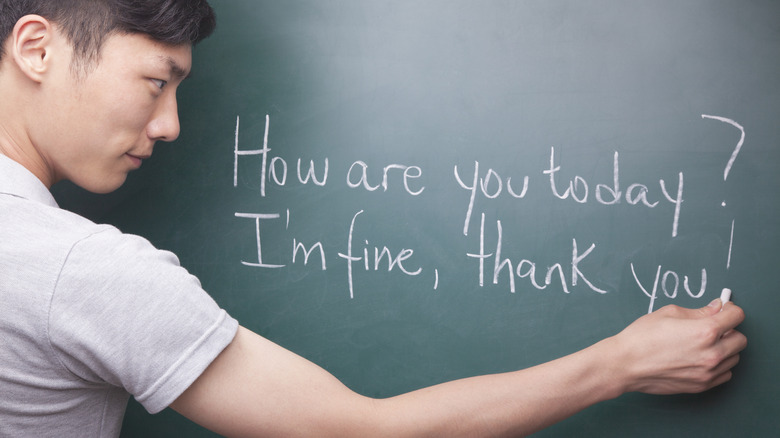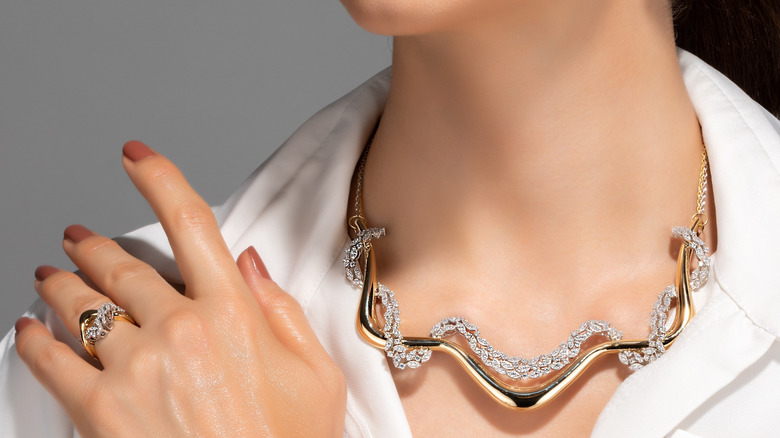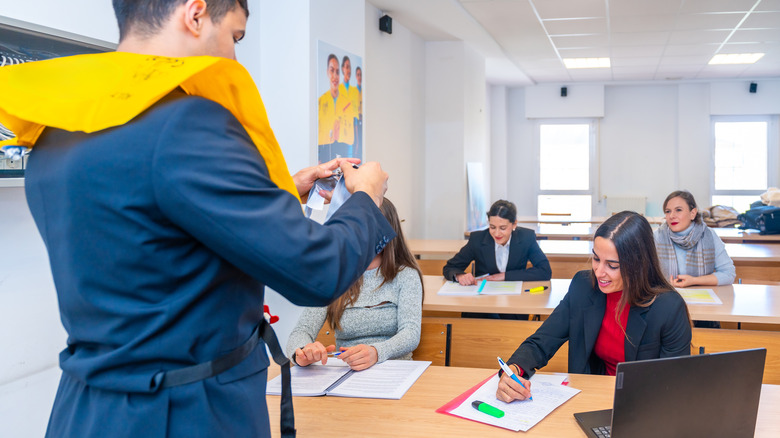The Most Unusual Rules And Requirements For Being A Flight Attendant
For anyone who has the travel itch with an insatiable wanderlust that just won't quit, being a flight attendant might seem like a dream job. Just think of the benefits. Depending on which airline employs you, you might be able to travel around the globe all in the name of work, and maybe even get to see once-in-a-lifetime vacation destinations that shouldn't be missed. Some attendants even have secret destinations where they love to vacation. It sure sounds like an exciting career, but being a flight attendant is not only hard work, it's also a competitive field. According to government statistics, there are about 20,000 openings for flight attendants in the United States each year.
Online forums suggest that less than 5% of people who apply to be flight attendants actually land one of these positions. To put that into perspective, that's a lower acceptance rate than some Ivy League colleges. Flight attendants have to deal with a lot on a daily basis, from irate, irritable passengers, to their own sleep deprivation and jet lag. And far from simply being servers in the sky, they play a crucial role in the smooth operation of a flight. Getting hired to be a flight attendant is no straightforward matter. In fact, applicants must follow a number of guidelines to be eligible for the job, like those below.
You might need customer service experience
Flight attendants play a crucial role in any flight. They work as a liaison between the pilot and the passengers, as well as provide a key interface with the ground crew. In terms of the safety of flyers, they are on the front line, since they make sure passengers are buckled in, know the way out of a plane if an emergency arises, and are familiar with equipment needed if something drastic happens on board. Even if they are sometimes unfairly known as a "trolley dolly," they clearly do so much more than just serve food and drinks. That said, of all the airline staff that you interact with during your flight experience, the cabin crew is the one that works face-to-face with the general public the most.
With that in mind, airlines look for prospective attendants who have a track record working directly with customers. That could be on a shop floor, as a sales agent, in a restaurant, or even some kind of social enterprise. What's important is that they have an understanding of how to deal with people on a personal basis. That way, the attendants won't feel intimidated when they are presented with a passenger who has had too much to drink and demands another top-up. Or when an anxious parent flying with their child for the first time is freaking out, or a flyer that's not feeling well just after take-off needs urgent assistance. Attendants might even offer tips on how to be the best passenger.
You must be a certain height
The reason for a height requirement is practical and has to do with the way a commercial passenger aircraft is designed. On most planes, passengers can place their bags under the seat in front of them, or in a compartment above the seat, known as the overhead bin.
Not everyone can reach those overhead bins, either because of physical limitations or size — think the elderly, the injured, or the young. In this case, a flight attendant will need to step in to place the item in the compartment, and they can only do that if they themselves are tall enough to do it. And if they are too tall, they might have difficulty moving around the cabin's more confined areas. While the actual height guidelines for an attendant vary from carrier to carrier, they fall roughly in the range of 5 feet to 6 feet. Mesa Airlines, based in New Mexico, for instance, requires applicants to be between 4 feet 11 inches, and 6 feet. For the Dutch carrier KLM, the attendant must be between 1.58 meters and 1.90 meters (or 5 feet 2 inches and 6 feet 2 inches, respectively).
Your appearance matters
As mentioned earlier, a flight attendant will spend a generous part of their shift interacting with passengers. In that respect, they represent the public face of the airline, more so than the pilot (who most passengers never even get to see), the ground crew (ditto for them), or the check-in agent (who you'll most likely only see for a few minutes). Given that responsibility, the airline will want their flight attendants to look as respectable and presentable as possible, since they are the people that most passengers are most likely to remember. Cabin crews are expected to generally have clear skin, and some may be required to wear make-up, though this isn't a necessity (Virgin Atlantic stopped this requirement a few years ago).
For attendants that have hair longer than shoulder length, they will typically need to tie it up so it appears neat. For men, beards need to be trimmed and tidy, and eyelashes for all genders need to be natural, and not overly layered with mascara. Similarly, hair needs to have a natural hue to it, without wild streaks or unusual shades. Piercings on the face are also a no-no, though a nose piercing is usually permitted. Simply put, an attendant should look respectable, as if they are going to a first interview for their dream job and desperately want to make a good impression.
You shouldn't have braces
This is tangential to the rules that govern an attendant's physical appearance. But the prohibition of braces isn't a requirement purely for superficial or cosmetic reasons. There is also the safety concern of having pieces of metal strapped to your teeth. Anyone who has had to endure the pain and suffering of wearing braces will know all too well that braces are not an enjoyable experience. They often cause headaches, dull pains in the jaw once the wires get tightened, and produce sharp, searing pain. The most common chance of this happening is when a wire comes loose, which really can happen at any time, and for no apparent reason.
The wire might poke into the side of your cheek, causing bleeding, and extreme discomfort in the braces wearer. Dealing with this might be fine when you are at home and can easily go to see your orthodontist to get it fixed. But when you are thousands of feet above the ground and trying to mollify a testy passenger in seat 33F, this can be both hazardous to your health, and your career. After all, it's easy to lose focus of your work when you have blood gushing inside your cheek. That is why some airlines won't hire staff that wear the standard bracket-and-wire braces (they can also look a little off-putting to some passengers). Removable braces and Invisalign-style ones might be permitted, however.
You can't show off your tattoos
Tattoos are now a part of daily life in the United States. You're likely to spot them on people sipping a latte in a coffee shop, aisle stockers in the grocery store, frequently on a sports star that earns millions of dollars per year, and even on members of government past and present. One-third of Americans have tattoos, and when you look at people under the age of 30, that number rises to two-fifths. Chances are that even if you don't have a tattoo, then you know a friend or family member who has one.
Airlines understand that tattoos are inked into the fabric of American life — for some people, they are a permanent souvenir of a trip — and they generally have no issues with their flight attendants having them. However, these tableaus of indelible art should not be visible when a flight attendant is wearing their uniform. So tattoos on the face, on parts of the arm or leg that are exposed, and on the hands, are all unacceptable if you want to work as cabin crew.
You should be healthy and strong
You might think that being a flight attendant is a cushy gig. After all, you get to fly all over the country or the world, you are put up in hotels when you are away from home, and you spend large chunks of a flight seated. What's not to love about it? The truth is a little more complicated than those images suggest. Being a flight attendant can be physically demanding, and staying in shape is important if you are to deal with the relentless rigors of the job.
Think about the exertion needed to lift a tightly packed, bulky carry-on bag weighing 30 pounds into the overhead bin. The food carts that attendants shuttle up and down the aisle are also incredibly heavy, weighing about 200 pounds or more when fully loaded. Pushing one down the entire length of a cabin is a workout. Attendants also need to open, close, and lock heavy cabin doors, and these require a certain amount of raw upper body power, so it's important to be in good physical condition.
You may need to be fluent in English
While English might not be the most widely spoken native language in the world — that award goes to Mandarin — it remains the international language of aviation. For U.S. airlines, it is a necessity that an attendant is fluent in English. Delta, for instance, demands that applicants have the "ability to speak, read, write, and understand English fluently." Even for airlines that aren't based in the United States, or aren't in a country where English is the native tongue, English is a prerequisite.
Air France, the national carrier of a country whose oldest city is an overlooked untouristy gem, states that attendants must be fluent in English, and even have a certificate to prove it. While English clearly is key, speaking a second language is also an asset. After all, if you are working on a flight where passengers don't have a good grasp of English, but can speak a different common language with you, then understanding the passengers' needs will be much easier. It might also help your application get to the next round.
You might need to be a competent swimmer
You may not want to think about this before you take your next flight, but sometimes things go wrong mid-air. An engine can malfunction, or a piece of equipment can suddenly stop working. In extreme cases, an aircraft will be forced into making an emergency landing. When the plane is over the sea, the pilot might have no option but to touch down on the water. In this case, flight attendants might need to get in the water to help passengers, or deal with other unforeseen situations.
To do this, they have to be comfortable in the water, so knowing how to swim is essential. Air France, for instance, stipulates that certain applicants must be able to swim 50 meters in 90 seconds. That said, the swimming guideline is not a hard-and-fast rule. United notes that flight attendants don't need to be good swimmers, or even know how to swim, but they should be able to move around in a pool while wearing a life jacket.
You'll be better suited if you are young
While many airlines don't place limits on older people being hired for the job, the work can be taxing. It can also take place during random times of the day or night. While age supplies the lessons that come from lived experiences, youth offers the unbridled energy needed to complete the hard, physical labor, and the ability to recover in time to do it all again. Minimum ages are more codified in terms of application guidelines, and airlines will often mandate that an applicant is at least 21 years of age — this is the limit set by Emirates, for example.
Of course, this doesn't preclude a person aged 45, or older, from applying for a cabin crew position. But, they need to bear in mind the actual minutiae of the job. An attendant might need to fly at night, and land in a country that is many time zones away from home. They might also need to return back home the next day, and somehow cope with the circadian calamity that ensues. Simply put, this schedule might be easier for youngsters.
You will have to undergo a background check
It goes without saying that flight attendants have a job that comes freighted with great responsibilities. For starters, they are the ones that close the cabin door to the outside world. If that's not properly done before take-off, disaster could ensue. They will also be the personnel directing passengers in case of an emergency. It is the flight attendants who will try to keep everyone calm and focused when things go wrong, such as when a passenger might learn of the eerie fact about oxygen masks that might make them feel a little uneasy.
Even if these nightmare scenarios rarely happen, cabin crew need to be prepared for them, and they are expected to be reliable, trustworthy, and professional throughout. This is why background checks are conducted, as a way to get a more rounded picture of a person and their history. The checks will look at prior employment, education, if the applicant has a criminal record, but also other aspects that might not seem so obvious. These include credit history, and even driving history. Drug testing is also to be expected as part of the process.
You need to curate your jewelry
A pretty necklace, or a set of pleasingly clinking bangles, can really make an outfit sing. But, for flight attendants, jewelry must be kept to a minimum. Some of this has to do with looking neat and professional, but another reason for the limit is to ensure safety. Cabin crew can usually only wear simple rings, and often one set of earrings which sit either on the ear or close by. Large hoop earrings, for instance, can easily snag or get caught, possibly on a passenger. Delta is very clear on what it demands of its flight attendants when it comes to jewelry.
Side-nose piercings are permitted, but the piece of nose jewelry must be a stud, and a tiny one at that, made of a precious metal or diamond. Similarly, earrings must be pearl, diamond, gold, or silver, and be stud type, with a maximum size of a dime, though two per ear are permitted. The kind of gauges that some people wear to stretch their earlobes are never allowed.
You have to complete training before being allowed to fly
So you've checked all the boxes, and on paper, you are the perfect candidate. So do you get the job? Alas, it's not quite that simple. All prospective flight attendants have to undergo a training course, often done at a dedicated facility in the airline's home base. United, for instance, conducts its training in Houston. This training can take many weeks, quite possibly more than one month, and during it, you will receive a small stipend and daily meals.
But just because you start the training, it doesn't automatically mean that you will come out the other end as a fully fledged flight attendant. Some people quit before training is over, others are disqualified before it ends. There are many reasons that people don't make it, from failing a drug test, to not being able to open a door during a training drill. But don't let that put you off. Persevere, and stay positive, and your dream job might soon be within reach, just like, hopefully, the overhead bin.
